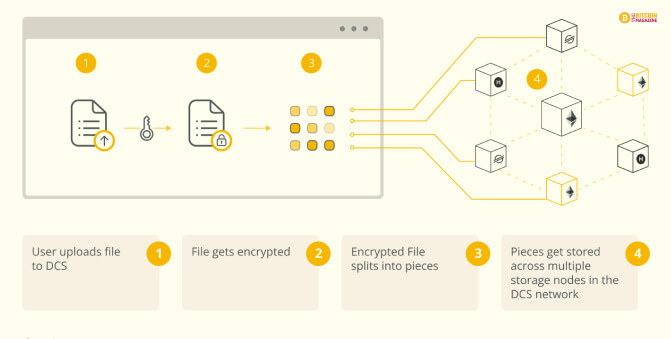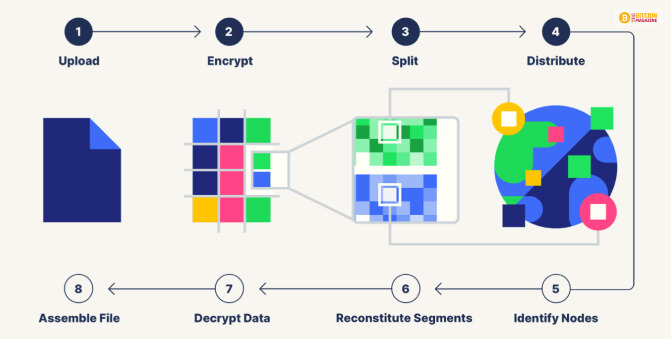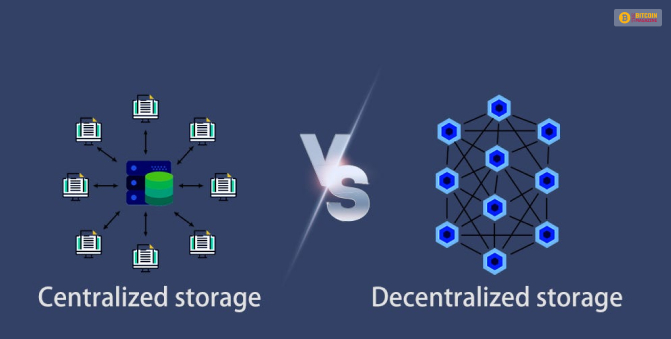The business world faces numerous problems regarding the storage of data on-premises. There are many technical issues and issues regarding costs; scaling the infrastructure in the upward and downward direction, along with maintaining the storage network, takes a lot of work. There is also a matter of dealing with security and data complexity.
Because of these issues, cloud storage evolved to deliver security, scalability, simplicity, and agility along with some cost-effective methods. Fortune Business Insights expects the cloud storage market to grow globally from $83.41 billion to $376.37 billion by 2029.
These centralized options allow one host to hold a lot of power. Decentralized storage has recently become a practical alternative to all the centralized options. The blockchain backs this option, and this application is becoming very useful in handling the data.
What Is Decentralized Storage?

Decentralized storage is a solution based on the blockchain network and does not depend on any centralized entity. This application stores data on different nodes in a decentralized network rather than in one server under one authority.
This ensures that your data is more secure as it is distributed and safeguarded against all errors and other risks. This storage option gives users complete control and ownership over their data and does not rely on any third party to keep it. StorX and InterPlanetary File System (IPFS) are a few examples of decentralized storage systems.
How Does This Work?

Let’s take the instance of StorX to understand how the system works. First, you have to create an account with a login ID and password and then use it to upload any data or files to StorX’s network. Under this hood, the network generates a private key that is unique to everyone, encrypts all the files, segregates the data into multiple parts, and dispenses it in various independent nodes.
To ensure excess data distribution, the network forms multiple copies of these individual pieces, ensuring that if one node is unavailable, retrieving data from other alternative nodes is possible.
Benefits Of Decentralized Storage
When any organization uses this network as its primary storage system, its main benefit is cost. Decentralized data storage is mainly based on leased extra capacity, which is relatively inexpensive.
In most cases, these storage networks are backed by the blockchain or similar technologies, delivering benefits like data immutability, better security, and enhanced privacy. Decentralized networks are tough. The storage does not have any failing points.
Centralized vs. Decentralized Storage

The decentralized platforms for storage are designed so that their performance is better than any of the centralized media. We are using StorX as an example here and compare their performances.
Storing Critical Data
The centralized storage systems are susceptible to restrictions and spoofing, whereas a decentralized network consists of more than 4,000 nodes, making StorX capable of holding critical data. All nodes here are enterprise-grade, meaning they are server-hardware in a minimum 3-tier data center.
StorX does not allow mapping any public data. People who own or have access to the data can retrieve it in their accounts with the help of private keys.
Using Encryption
A few centralized storage systems want to compete with the decentralized ones and create a hybrid solution that does not have the core elements that a decentralized network supports. It does not allow transferring the data to the dispersed network.
StorX, however, uses transport and content encryption, making the stored data even more secure. It also offers decentralized cloud storage, which offers military-grade encryption and fragmentation techniques, ensuring the data stays secure as no single node has the complete data with itself.
Advanced Cloud Storage
The data is stored in a single file server in a particular geographic location in any regular cloud storage. Decentralized data, on the other hand, divides the file into multiple fragments and distributes it to various locations worldwide. As this network has no point of failure, it holds the capacity to resist numerous simultaneous disruptions or censorship, for that matter.
StoeX has a mechanism that has the best bits. Apart from distributing the file to different nodes, these are server-level hardware, unlike any computer. The users are presented with an advanced form of cloud storage, amalgamating decentralized data and traditional cloud structure.
Enhanced Speed
In conventional storage, a big chunk of the data is stored with one single source, whereas decentralized systems have various nodes for storing the data. In centralized storage systems, speed depends on multiple factors, including connectivity, bandwidth, and the server’s number of processors.
But in StorX, a decentralized system, the system questions the network and gets the data from the nearest nodes, giving the best data retrieval speeds.
Bottom Line
Decentralized system for storage has grown popular and might continue to do so in the future because they offer various benefits that the traditional storage system cannot. The decentralized system has high security, improved readability, and data privacy. They are also cost-effective and have better availability of storage resources.
In addition, decentralized storage systems are believed to improve security, scalability, and usability in the near future. This makes it more appealing to the users, including organizations and individuals.
Additional Reading:

